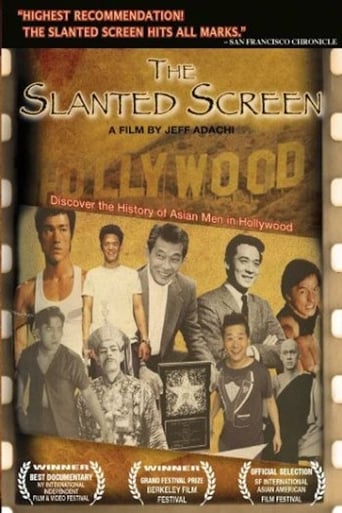Exoticalot
People are voting emotionally.
Robert Joyner
The plot isn't so bad, but the pace of storytelling is too slow which makes people bored. Certain moments are so obvious and unnecessary for the main plot. I would've fast-forwarded those moments if it was an online streaming. The ending looks like implying a sequel, not sure if this movie will get one
Ezmae Chang
This is a small, humorous movie in some ways, but it has a huge heart. What a nice experience.
Raymond Sierra
The film may be flawed, but its message is not.
gavin6942
From silent film star Sessue Hayakawa to "Harold and Kumar Go to White Castle", the Slanted Screen examines the portrayal Asian men in film and television, and how new filmmakers are now re-defining age-old stereotypes.This documentary opened my eyes a bit, as I was not even familiar with the work of silent star Sessue Hayakawa. In fact, it never even occurred to me how much the Asian community was excluded from Hollywood.So, Bruce Lee was the "James Dean" of the Asian community? I can see that. For years, there were whites playing Asians (typically nasty, villainous Asians) and even today racism against Asian stereotypes is more tolerated and "acceptable" than against other targets.
zeidmanart
This film is well-written and directed. In between recent interviews of Asian American male actors, writers, directors and critics, is interspersed archival footage showing the roller-coaster ride of these actors. While Sessue Hayakawa, film star and romantic lead, drew big and mixed audiences, others toiled in unfavorable type casting and stereo type. The exclusion laws and World War II took their toll and set back Asian American progress in the film industry. Even worse was the use of non-Asian men in makeup to appear Asian, big in the 30s. Don't miss the discussion panel in the extra features. I think that the interview with James Shigeta is the most informative. All taken, this is a fascinating film.
piazaag
The documentary showd Hollywood portrayal of Asian Americans from the silent file era to today, and it claims that really nothing has changed much during this time. This should be expected since the amount of Asian immigrants coming to this country has steadily increased during this time. I think currently it's still increasing after they lax'd the immigration laws. Of course if there are more and more first generation immigrants, Asian Americans are going to be portrayed like them since they represent the majority. Asian Americans born in the United States are also increasing but at a slower pace, and they are statistically not representative of the majority of Asians in this country, and Hollywood is not going to make that distinction nor should we expect them to. So unless Asian immigration goes down, or the overall quality of those first generation immigrants goes up, neither of which is very likely then we should expect pretty much the same for the next 80 years or so.
maya7-1
Identity politics have repeatedly demonstrated that marginalized minorities hunger for accurate and appropriate cinematic representation. Adachi has successfully satisfied this hunger and accomplished for Asian American males what "The Celluloid Closet" did for its queer constituency and "The Bronze Screen" for Chicanos. The premise of "The Slanted Screen" is articulated in its project summary: "Movies and the mass media help form our world view, shape our identities, and define our roles—on screen and off. Unfortunately, these effects frequently work to the detriment of some groups—including Asian American men. Too often, film and television misrepresent the world they claim to reflect. Their stories revise history, and rationalize inequities. Rather than portraying three-dimensional individuals, their characters manifest prejudice, and reinforce bigotry. Moreover, their ubiquitous and persistent messages encourage viewers to internalize confining definitions of identity and self-worth. Ironically, film and television images extol our fundamental ideals of democracy and equality, and at the same time, betray them." Darrell Hamamoto, Associate Professor of Asian American Studies at U.C. Davis, writes in _Monitored Peril_: "Images of control are used as an iconic shorthand to explain, justify and naturalize the subordination of Asian Americans within a society that espouses formal equality for all." In order to understand history, to situate ourselves within history, we must be engaged by it first and foremost and Adachi has provided an informative, engrossing well-structured vehicle to review how Hollywood's Dream Factory has portrayed Asian Americans from the turn of the century through the turn of the millennium. Utilizing a wealth of clips and interviews Adachi has balanced a recapitulation of representations past with divided concerns over future representation. By its thorough methodology, the documentary achieves solidarity with other minorities in film endeavoring a mutual historical task. It is one of those cases of "enantiodromia", where by diving headlong into the particular concerns of a specific minority, by unveiling "the symbiotic relationship between stereotypes and prejudice", we come out addressing the issues that affect us all, aiming for a society more just for all. That is, at any rate, the hope. "The Slanted Screen" inspires hope that stereotypes might eventually be no longer necessary.

